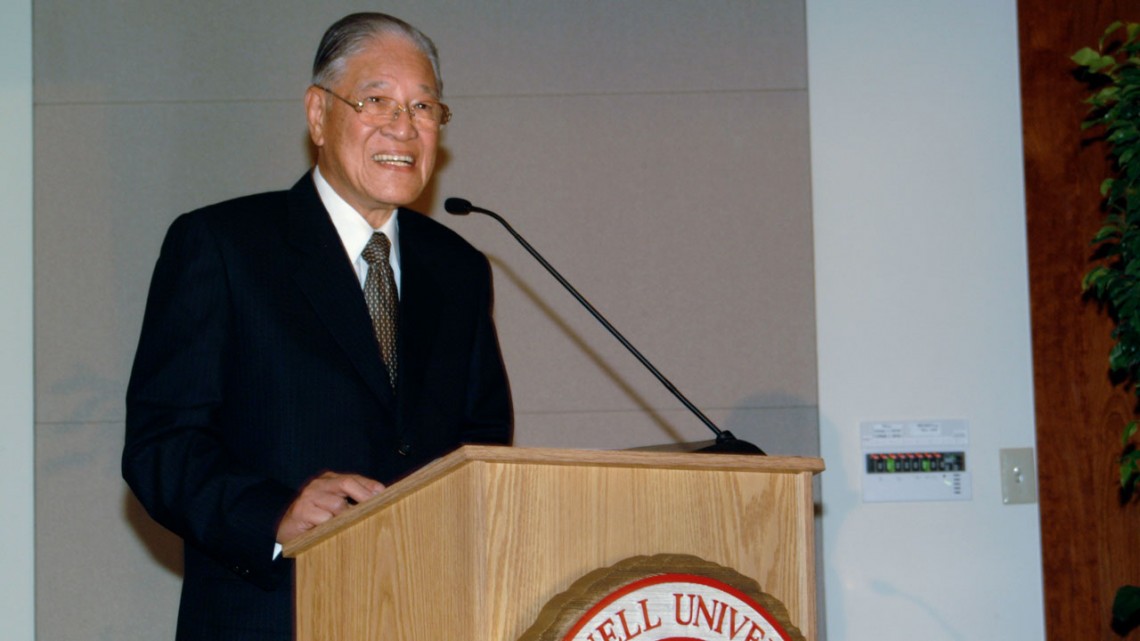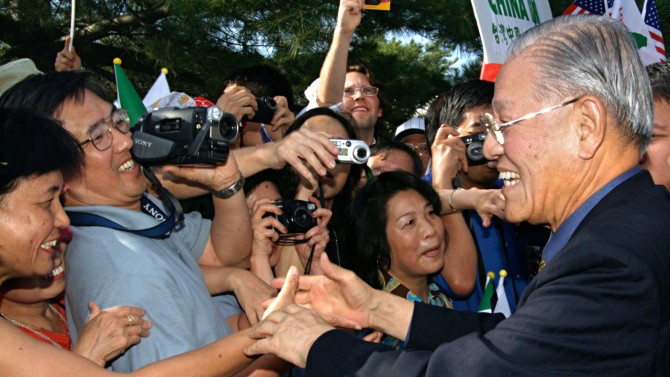
Former Taiwan President Lee Teng-hui, Ph.D. ’68, discusses Taiwan, Cornell and other topics in a 2001 lecture on campus.
Lee Teng-hui, Ph.D. ’68, former Taiwan president, dies at 97
By Blaine Friedlander
Lee Teng-hui, Ph.D. ’68, the first popularly elected president of Taiwan, who helped guide the island toward prosperity and democracy, died July 30 in Taipei. He was 97.
After earning a Cornell doctoral degree in agricultural economics at age 45, Lee returned to Taiwan, where he was appointed to a number of governmental positions, including the mayor of Taipei (1978-81) and the provincial governor of Taiwan (1981-84).
In 1984 he was nominated by President Chiang Ching-kuo (Chiang Kai-shek’s eldest son) as his vice president. When Chiang died in 1988, Lee succeeded him as president and chairman of the Kuomintang. In 1995 he was elected outright and served until 2000.
“He was proud to call himself a Cornellian,” said Cornell President Martha E. Pollack, “and his commitment to academic excellence set an example for generations of Taiwanese students – many of whom were inspired to follow his path to Cornell.”
One of those who followed in his footsteps was Taiwan’s current president, Tsai Ing-wen, who earned her LL.M. degree at Cornell Law School in 1980 and was elected president in 2016. She tweeted: “This is a day of mourning for me & all Taiwanese with the passing of our former President Lee Teng-hui. He laid the foundation for a democracy built on pride & our own identity, & his legacy will guide generations of Taiwanese to face the challenges ahead with courage.”
Lee’s rapid rise at Taiwan’s political scene happened shortly after earning his doctorate at Cornell, said Chen Jian, the Hu Shih Professor of History Emeritus, who met Lee twice when he was president.
“Lee will be remembered as a leader who played a significant role in Taiwan’s transition toward democratization and who also shaped the trajectory of Taiwan’s increasing separation from mainland China,” Chen said. “History will judge.”
In a 1995 Cornell Chronicle story, Lee – called “T.H.” by his professors – was older than most graduate students. He was reserved “and not an extrovert or a politician,” said the late Kenneth L. Robinson, a professor of agricultural economics, who was on Lee’s dissertation committee.
The dissertation, “Intersectoral Capital Flows in the Economic Development of Taiwan, 1895–1960,” concerned transfers of income and capital investments between rural and urban areas in Taiwan. The American Agricultural Association selected it as the outstanding dissertation of 1968; it was later published as a book of the same name by Cornell University Press.
Almost four decades after graduating, Lee was invited to give the annual Spencer T. and Ann W. Olin Lecture at the 1995 Cornell Reunion, sparking tension between the United States and China, since the United States had normalized diplomatic relations with the People’s Republic of China in 1979.
Then-Cornell President Frank H.T. Rhodes welcomed Lee to campus, saying, “This is a great day for Taiwan, for democracy and for Cornell.”
Lee delivered the lecture – titled “Always in my Heart” – on June 9, 1995, in what is now the Newman Arena at Bartels Hall. Several hundred reporters from around the world covered the visit; the lecture was broadcast throughout Asia and around the world.
The lecture focused on his Cornell journey and on Taiwan.
“My years at Cornell from 1965 to 1968 made an indelible impression on me. This was a time of social turbulence in the United States, with the civil rights movement and the Vietnam War …,” he said. “I returned to my homeland determined to make my contribution toward achieving full democracy for our society.”
Lee felt that Taiwan had achieved successful political reform and economic development.
“Essentially,” he said, “the Taiwan experience constitutes the economic, political and social transformation of my nation over the years. [It is a] transformation which I believe has profound implications for the future development of the Asia-Pacific region and world peace.”
Cornell University Councillor Tom Smith Tseng ’87, M.Eng. ’94, who as a staff member in Alumni Affairs and Development was involved with the event, recalled the visit as “a trip down memory lane” for Lee and his wife, Tseng Wen-hui.
“They stopped by their old apartment on State Street to pose for photos. They walked around the Ag Quad and went to Beebe Lake. They visited with two of Lee’s thesis advisers, saw his old graduate student office and admired the blossoms in Minns Garden,” Tseng said. “I thought I sensed in him the kind of happiness and nostalgia every reunion-ing Cornell alum would experience.”
Lee visited Cornell again in 2001.
Born Jan. 15, 1923, Lee is survived by his wife, Tseng Wen-hui, and two daughters. He was predeceased by his son in 1982.
Media Contact
Get Cornell news delivered right to your inbox.
Subscribe

